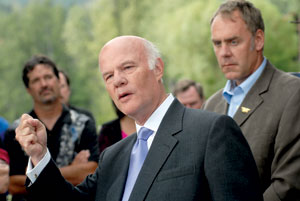When Stan Stephens was elected as Montana’s 20th governor in 1988, replacing Democrat Ted Schwinden, it started a run of 16 straight years of Republican control in the governor’s office. That streak was broken when political newcomer Brian Schweitzer claimed a victory for the Democrats in 2004 and was then reelected in 2008.
With Schweitzer now term limited, the door is open for Republicans to once again take the state’s gubernatorial reins. And there are seven candidates who have until the June 5 primary to convince voters they are the right choice to put Republicans back on top.
The Republican primary winner will have a formidable foe in November’s general election, with the presumptive Democratic candidate, Attorney General Steve Bullock, boasting a large bank account and name recognition.
Former Congressman Rick Hill of Helena has consistently led the packed Republican primary in both polls and campaign finances. The other six candidates are former state Sen. Corey Stapleton of Billings; former state Sen. Ken Miller of Laurel; security and anti-terrorism consultant Neil Livingstone of Helena; former Department of Transportation Director Jim Lynch of Kalispell; Choteau County Commissioner Jim O’Hara; and Bob Fanning of Pray, who is perhaps best known for his anti-wolf activism.
While Hill has been the frontrunner since day one, his opponents say he has had months to put the race away and failed to do so, leaving windows of opportunity for another candidate to make a run.
A lack of polling makes it difficult to precisely gauge where the candidates stand, but a Public Policy Polling survey from December showed Hill leading with 37 percent of the vote, Miller in second with 10 percent and the remaining candidates in single digits. A Montana Chamber of Commerce poll from November put Hill’s lead at 29 percent to 15 percent over Miller.
Hill’s opponents have sought to frame him as the “establishment” candidate in a tea party era where the word “establishment” has acquired newly negative connotations. Miller has often been the most pointed in his criticism of Hill, publicly challenging Hill on his wolf management plan and calling him an “establishment moderate” on his campaign website.
The flip side of the establishment candidate discussion is that Hill does indeed have widespread support among the Montana Republican party establishment, with a long list of GOP legislators backing him and a robust campaign bank account.
 |
|
Republican Neil Livingstone, front, addresses a small crowd gathered at a fundraising event in Whitefish. |
Stapleton points out that a large percentage of voters in polls are undecided. He says the primary will largely come down to candidates proving themselves to that wide cross-section of undecided voters.
“That’s the million-dollar question: What are (the undecided voters) looking for?” Stapleton said.
In an interview last week, Hill said none of the other candidates has made a strong move to surpass him, with time running out in the primary season. Meanwhile, he says he has been steadily increasing or at least maintaining his overall lead.
“The point is we’ve been growing in the polls and they’ve been diminishing in the polls, which suggests to me that they really haven’t been able to take advantage of that window of opportunity when it was there,” Hill said.
In the most recent campaign finance reports, Hill continued to pad his significant financial advantage with more than $300,000 in cash on hand. The next closest is Stapleton with $160,000 in the bank and Miller with $80,000.
Hill’s campaign likes to point out that Miller, Stapleton and Livingstone have given themselves far more personal loans and donations than the frontrunner has. The campaign says Hill and his running mate, Kalispell Sen. Jon Sonju, have raised more money from individual contributors than all of the other candidates combined.
Bullock leads all candidates with more than $500,000 in his campaign bank account.
Since no candidate except for Lynch is from west of the continental divide, there has been a push to select running mates from the western half of the state – specifically from the Flathead Valley, a conservative stronghold with a significant number of voting Republicans.
Hill’s running mate, Sonju, is local a businessman, while Stapleton’s running mate is former state legislator Bob Keenan of Bigfork and Livingstone is running with Sen. Ryan Zinke of Whitefish. Fanning at one point also had a Flathead lieutenant governor mate in pastor and former Constitution Party presidential candidate Chuck Baldwin, but Baldwin withdrew from the ticket.
For his running mate, Miller selected Public Service Commissioner Bill Gallagher, who lives in Helena but previously resided in Polson and maintains ties in the Flathead area.
In a February interview, Gallagher recalled being asked a question after he won his PSC seat, which oversees a district spanning from Lewis and Clark County to Flathead County. The question: “How did you win?” The answer: “You don’t ignore the Flathead.”
While the six candidates chasing Hill will try to make the case before June that they are the better choice than the frontrunner, Hill will continue making the case that he is the best candidate to defeat Bullock.
Public Policy Polling surveys have shown Hill and Bullock in nearly a dead heat in a general election matchup, with Hill having the slight advantage. No other Republican comes close to Bullock in the polls, a point Hill will drive home in this final month of the primary season.
“The distinction is: Who can actually win in November?” Hill said.